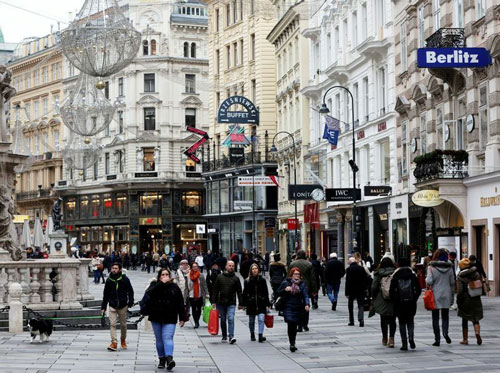Vienna
Austria on Sunday extend its third COVID-19 lockdown into February, hoping to drive down infection rates despite an influx of variants that spread the coronavirus more easily.
The goal is to let shops, museums and personal services like hairdressers reopen from Feb. 8, while the catering and tourism sectors will stay shuttered until at least March.
Ski lifts remain open, while schools will resume in-person instruction after the semester break next month.
“We have two to three hard months ahead of us,” Chancellor Sebastian Kurz told a news conference, flanked by regional leaders and health officials in a show of unity a day after thousands marched in Vienna to protest against restrictions.
Austria, a country of 8.9 million people, is in its third lockdown, with only essential shops open. The country has reported nearly 390,000 coronavirus cases and almost 7,000 COVID-19-linked deaths since the pandemic began last year.
The government said it wants to get new infections down to 50 per 100,000 residents over a seven-day period, from 130 now. That would be the equivalent of just below 700 new cases per day as it ramps up testing and vaccinations of vulnerable people.
Kurz left open the prospect of extending the lockdown if case numbers remain stubbornly high.
“At a time of a pandemic there are no guarantees,” he said.
The government said people should work from home where possible, doubled to two metres the distance people must stay away from others, and instructed the population to wear FFP2 masks in stores and on public transport from Jan. 25.
Finance Minister Gernot Bluemel said companies hit by the restrictions could get extra state aid covering up to 30% of lost revenue, capped at 60,000 euros ($72,468) per month.
The government had already paid out 2.4 billion euros in aid to 129,000 companies. In total, Austria had paid or set aside more than 31 billion euros to help companies and preserve jobs, he said.
Britain’s government hopes to ease some lockdown restrictions in March as it presses ahead with Europe’s fastest rollout of COVID-19 vaccines, foreign minister Dominic Raab said on Sunday.
The country, which also has Europe’s highest COVID-19 death toll, has been under national lockdown since Jan. 5, with schools closed for most pupils, non-essential businesses shut and people ordered to work from home where possible.
“What we want to do is get out of this national lockdown as soon as possible,” Raab told Sky News television.
“By early spring, hopefully by March, we’ll be in a position to make those decisions. I think it’s right to say we won’t do it all in one big bang. As we phase out the national lockdown, I think we’ll end up phasing through a (regional) tiered approach.”
Prime Minister Boris Johnson has set a target of vaccinating the oldest age groups, the clinically vulnerable and frontline workers – roughly 14 million people – by the middle of February.
He has said that England can consider easing lockdown restrictions from that time if all goes smoothly.
The Sunday Times said that British ministers had settled their differences to back a three-point plan that could lead to some lockdown restrictions being lifted as soon as early March.
Areas will have restrictions eased once their death rate has fallen, the number of hospital admissions drops and some people aged between 50 and 70 are vaccinated, the newspaper said.
It quoted ministers as saying they were prepared to resist pressure from health advisers to delay the changes until most people are vaccinated, a process that could take until the autumn.
A spokesman in Johnson’s office declined to comment on the report.
The head of England’s public health service said the vaccination programme had made “a very strong start” but a quarter of people hospitalised were aged under 55, younger than the priority target groups.
“It’s not going to be the case that on Valentine’s Day or the 15th of February, with one bound we are free. But, equally, I don’t think we will be having to wait until the autumn,” Simon Stevens told BBC television, referring to the easing of restrictions.
“This is going to be a progressive improvement as we get more coronavirus vaccination supply.”—Reuters










